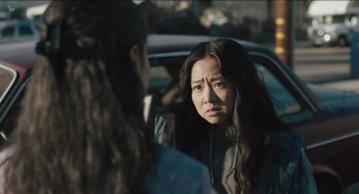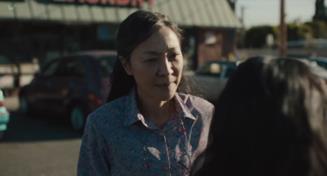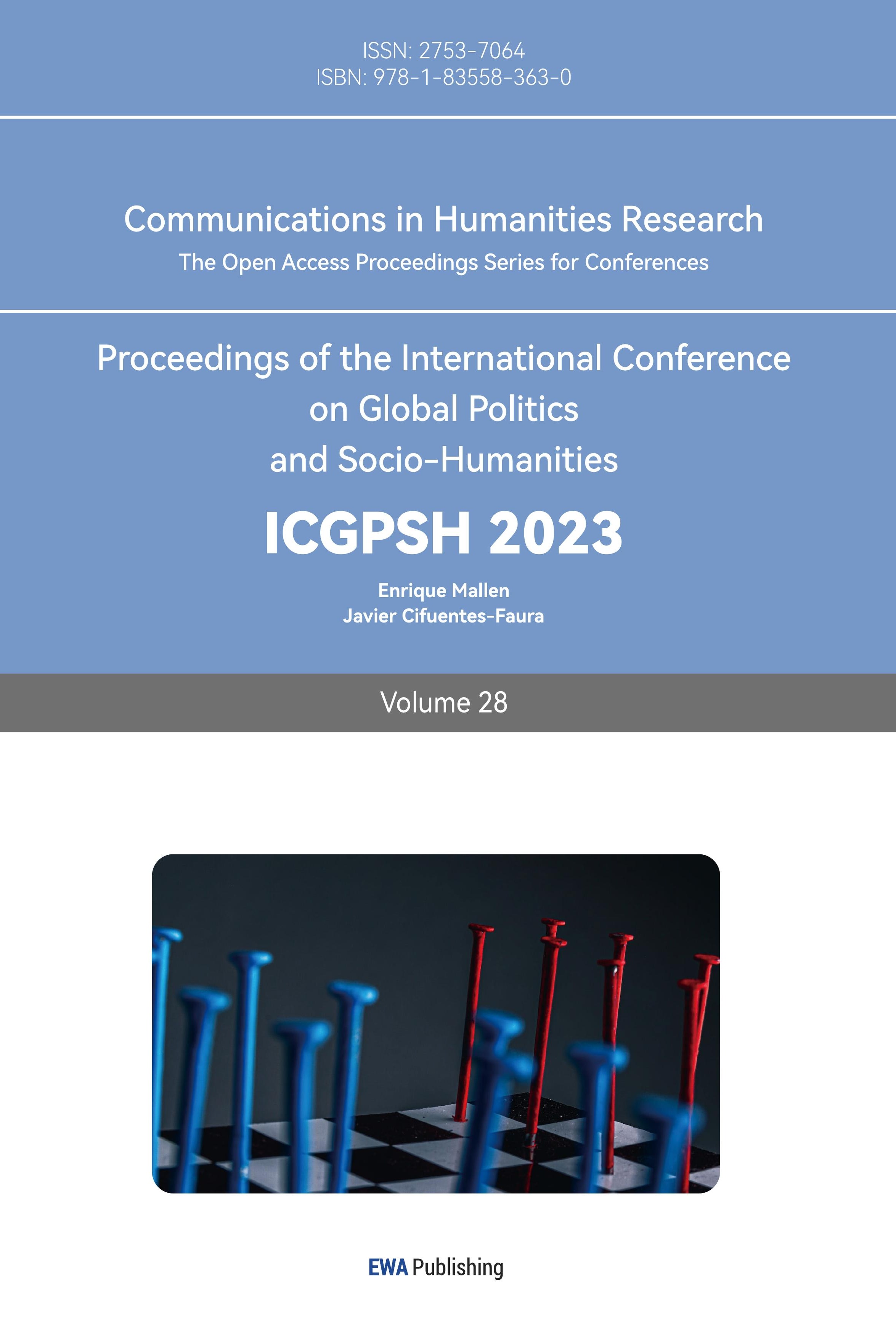1.Introduction
Simone de Beauvoir explained the mother-and-daughter relationship in her book The Second Sex [1]. She stated that the mother sees her daughter as her other self and cannot accept her daughter becoming someone else. Chizuko Ueno had similar interpretations about the relationship between mother and daughter in her book Disgust Against Women (The Feeling of Disgust against Females in Japan). She extended further in the relationship that daughters, to get rid of the struggling kinship between herself and her mother, would have to marry another man. However, this statement only works for heterosexual women who would want to have a relationship with men. Ueno did not mention actions that a daughter with queer identity, who would not get married to a man, would take to find ways to solve her problems with her mother. This is where a film with a specific example of this unique relationship would be useful. The film Everything Everywhere All At Once displays an Asian diaspora family that didn’t really follow the traditional Asian family structure or aspect. The family includes a dominating and aggressive mother, a lesbian daughter, and an indecisive father [2]. Thus, this paper will provide a different perspective for analyzing Ueno’s statement of misogyny in the mother and daughter relationship: in a case where the daughter has a queer identity.
2.Literature Review
2.1.Everything Everywhere All At Once
The movie Everything Everywhere All At Once, directed by Daniel Kwan, and Daniel Scheinert told a story of a Chinese American immigrant Evelyn Wang who has to enter a muti-universe to stop her daughter Joy, or Jobu Tupaki, from destroying the universe she lives in and every other universe. With the help from Alpha-Waymond, Evelyn’s husband who came from the alpha-universe where alpha-Evelyn is already killed by Jobu Tupaki, who she accidentally created by pushing her power to limits, Evelyn was able to gain access to the powers and experiences other Evelyns have in other universes by accomplishing small and weird tasks. Just when Evelyn encountered Jobu Tupaki and prepared to fight, Jobu told her that she didn’t come to Evelyn to fight but instead wanted Evelyn to see the ‘Everything Bagel’ which she puts everything in the universe into. Jobu wanted Evelyn to see, like she did, the truth of everything: nothing matters. Evelyn was persuaded by Jobu and acted rudely and nihilistically to the people around her in other universes. However, just when Evelyn was ready to enter the bagel, which will truly end her life, with Jobu after all the nonsense she had been through, she heard Waymond in her original universe convincing people that instead of fighting with each other, people should be kind, even when nothing makes sense. Evelyn, persuaded by Waymond, again found the hope of life, and wanted to also pull Jobu away from the bagel. Jobu begged Evelyn to let her go. She told her that she was too tired of all the things she had been through; nevertheless, Evelyn stated that even though nothing matters, everything that is going on in every universe makes people feel like nothing, and that they might only experience small fractures of time together, she still wanted to be with Joy and she would never let her go. At last, Jobu decided to be with Evelyn and embraced her. The directors in the film, through displaying the continuous tensions and debates between Evelyn and Joy, aim to demonstrate the fact that although people might feel useless and mealiness sometimes in life, there will always be something they can hold on to, something to love, and something to live up to.
2.2.Misogyny in Mother-Daughter Relationship
Chizuko Ueno, in her 2010 book Misogyny Between Mother And Daughter, stated that “...daughters think hating their mother is shameful and unforgivable. Why is that? Mothers are the oppressors and the victims. The daughter’s resentment towards her mother manifests itself in self-reproach and self-loathing. The daughter could not forgive herself for hating her mother, because the original love remained in her hate.” Ueno argued that the daughter’s hatred is focused on her mother but also on herself because she cannot stand the fact that her mother kept putting overloading pressure and expectations on her, but she at the same time blames herself for not being able to help in her mother’s problematic situation. In other words, the daughter’s misogyny in the mother-daughter relationship also involves self-hatred because she understands that her mother had sacrificed a lot for her, but still the gratefulness she has towards her mother wasn’t enough for her to have the will meet every expectation her mother has on her. This causes the daughter to struggle between the two affections she had towards her mother. She would not be able to totally hate her mother because she still loved her for how she had taken care of her and raised her, but she also couldn’t fully love her mother because she hates the fact that she always had expectations of her that she doesn’t want to achieve.
3.Analysis
The relationship between Joy’s queer identity and the misogyny she had towards herself and Evelyn is complicated. To be more precise, queer identity was part of what Evelyn disliked of her daughter at the start of the film; however, it is also a significant concept that Evelyn was able to experience and understand through her adventure in the multiverses so that she could embrace Joy. In this part, the author will provide an in-depth analysis on the relationship between queer identity and misogyny of the two main characters, Joy and Evelyn.
3.1.Character Analysis
Although Evelyn and Joy in some respects, both had experienced the struggle of kinship and identity, they still uphold different dilemmas.
3.1.1.Evelyn
According to Ueno, mother raises their daughter to make them their doppelganger, by which daughters would become a source that they use to accomplish the goals they’ve failed to accomplish [3]. Thus, in this case, Evelyn sees Joy as her “other self”. She set rules and disciplines for her daughter and complains on her daughter because she expects that her daughter will be able to achieve things that she once wanted to do. This would then be the reason why even though Evelyn told Joy that she was open and had accepted the fact that her daughter is a lesbian, she, at the bottom of her heart, still believes that there is a reason for all her daughter’s unexpected actions and identity. Moreover, when she confronts Jobu Tupaki, she says that all that she wants is to have her daughter Joy back. Jobu explains that she is her daughter; they are the same person, but Evelyn still resists believing. This is because Evelyn still wanted to believe that her “original” daughter would be not as wild, and chaotic as Jobu, that her daughter could still become her “other self” who isn’t a lesbian, doesn’t get tattoos, and hasn’t dropped out of college. Evelyn fails to understand the fact that all these characteristics she dislikes of Joy is a projection of what she dislikes of herself. Evelyn wanted to see her daughter become a successful, talented person that she herself failed to become. Unfortunately, Evelyn finds out that her daughter was just everything like her (add the citation of the original film): stubborn, and useless. Evelyn could not believe that Joy become everything that she wanted, so she blamed it all on the other version of her daughter Jobu. Thus, wanting to bring her Joy back, Evelyn decided to become as fragmented as Joy by frequently traveling through the multiverses to gain access to many powers. Evelyn whistled to Gong Gong: “…maybe I’ll be strong enough to save my Joy” 01:08:50 - 01:08:59). Nevertheless, after traveling in multiverse, Evelyn was able to understand Joy’s dilemma for being a lesbian and experiencing mother’s disrespect to her queer identity. To be more precise, Evelyn, through traveling in different universes and being different Evelyns who had different identities and characteristics (which includes being a queer herself), began to understand the fragmental experiences resembling those of Joy and Jobu.
3.2.Joy (Jobu Tupaki)
At the start of the film, Joy has been trying to find a time to have a conversation with her mother, Evelyn about coming out in front of Gong Gong, her grandpa. However, Evelyn was too caught up by the mess in her laundromat that she kept ignoring her daughter’s needs. In this case, Joy, as a daughter with queer identity, is marginalized in front of her mother. “This introduction presents Joy's inability to be fully seen, heard, or comprehended.” [4]. Moreover, Joy’s queer identity’s inability to be fully seen also demonstrates Evelyn’s ignorance of her daughter’s individualistic characteristics. Evelyn still believed that Joy’s identity as a lesbian is something that has been distorted and not right. In other words, she couldn’t accept that this identity is something that she truly owns. Thus, Evelyn chose to ignore her daughter’s needs.
On the other hand, “Nothing Matters” is a belief that Joy held after seeing the truth in the “everything bagel” which she put everything into. Jobu Tupaki’s belief that “Nothing Matters” is like those of queer theorists who aims to think “beyond the current classist, sexist, heteronormative systems” [4]. Moreover, the characteristic of Jobu Tupaki was seen as chaotic and destructive and something that people in the Alpha-verse and Evelyn believed that she had to put down. In this case, the present of Jobu Tupaki lead to Evelyn’s belief that she had to put down Jobu and bring back her normal daughter can also be seen as Evelyn’s wish to restore her daughter as something that she could control and manipulate.
3.2.1.Staging in the Film
Throughout the whole film, most of the costumes that Jobu Tupaki had were exaggerated and unconventional. These clothes can be seen as her wish to be actually noticed and focused on as a queer member by others and especially her mother, Evelyn. This callback to Joy’s invisibility at the start of the film, where she, as a lesbian, is often neglected, demonstrates Joy’s disappointment and rebellion for not being respected as a queer member by her mother.
At the same time, most of Jobu’s makeup and hairstyle often convey a sense of chaos and melancholy. To be more precise, Jobu’s makeup often implies that she has cried or is crying. For example, according to figure 1 (00:53:16), Jobu’s implication that Jobu is crying is the tears-shaped diamonds that surround her eyes. Similarly, for Jobu in figure 2 (01:50:07), evidence that Jobu had cried is how the rims of her eyes is colored with red and decorated with glimmering powder. These implications convey how Jobu is still disappointed by the fact that her mother couldn’t understand her queer identity but also her self-hatred that she cannot meet her mother’s expectations. Additionally, the messy braid of hair Jobu had in front of her forehead displayed in Figure 2 demonstrates Jobu’s struggling and chaotic mind as she entangles between her own identity and her relationship with Evelyn.

Figure 1: Jobu Tupaki confronting a police officer

Figure 2: Jobu Tupaki deciding to walk into the Everything Bagel
3.2.2.Cinematography
For most of the time, when Evelyn and Joy confront each other, the shots are medium close-up shots. These shots would focus on Joy and Evelyn’s emotions. For example, in figure 3 (00:10:55), Joy’s disappointment and entanglement is clearly demonstrated by her facial expressions; following up Joy’s medium close-up shot, Evelyn’s facial expressions convey a sense of struggle to apologize to her daughter is also clearly shot in figure 4 (00:10:57). At the same time, the shots are shot at an eye-level angle, this demonstrates Joy’s wish to communicate to Evelyn evenly and equally. This sequence of Evelyn and Joy’s confrontation illustrates how their relationship are falling apart because of Evelyn’s failure to understand what her daughter truly wants and Joy’s inability to withhold her mother’s expectations.

Figure 3: Shot of Joy’s dissapointment towards her mother

Figure 4: Shot of Evelyn’s struggle to apologize to Joy
Therefore, by analyzing Joy’s invisibility, Jobu’s belief that nothing matters and her appearance, Joy’s queer identity and her misogyny in herself and Evelyn is demonstrated by which she thinks that she had failed her mother’s expectations by being a daughter with queer identity.
4.Conclusion
Overall, Joy’s queer identity and her misogyny of self-hatred led to her total chaotic mind and her wish to disappear from the multiverses; at the same time, Evelyn’s experience of fragmentation like a queer member when she travels in the multiverses helps her to understand her daughter’s problematic situation. She was then able to embrace her daughter disregarding her unfulfilled expectations. However, we shouldn’t neglect the role of Asian diaspora and multiplicity in the film. This is because that multiplicity comes from the concept of multiverses [5]. There might be a universe where Evelyn gets married to Waymond but did not leave China. Growing up in a community that carries the traditional Asian cultural value of filial piety instead of growing up in one that is more individualistic, would Joy still understand what it meant to be a lesbian? Would she conceal her queer identity in front her mother? These are questions that would need to further research on.
References
[1]. De Beauvoir, S. (1949). The Second Sex. Vintage Classics.
[2]. Liu, M. (2023). Love in Shadow: The Narrative of East Asian Mother-Daughter Relationship in Contemporary Films (p. 60).
[3]. Ueno, C. (2015). Yan nü: Riben de nü xing xian wu (L. Wang, Trans.). Shanghai San Lian Shu Dian.
[4]. Carrillo-Vargas, D. (2022). Bridging the Fragmented Identities and Experiences of Immigrant and Queer Women of Color: A Queer Analysis of the Film Everything Everywhere All at Once (pp. 5–7).
[5]. Sudhakaran, A. (2023). Motherhood in the Multiverse: Melodrama and Asian American Identity in Everything, Everywhere, All at Once (p. 2).
Cite this article
Wang,W.Z. (2024). Daughter's Dilemma: Queer Identity and Misogyny in Mother-Daughter Relationship in Everything Everywhere All At Once. Communications in Humanities Research,28,198-203.
Data availability
The datasets used and/or analyzed during the current study will be available from the authors upon reasonable request.
Disclaimer/Publisher's Note
The statements, opinions and data contained in all publications are solely those of the individual author(s) and contributor(s) and not of EWA Publishing and/or the editor(s). EWA Publishing and/or the editor(s) disclaim responsibility for any injury to people or property resulting from any ideas, methods, instructions or products referred to in the content.
About volume
Volume title: Proceedings of the International Conference on Global Politics and Socio-Humanities
© 2024 by the author(s). Licensee EWA Publishing, Oxford, UK. This article is an open access article distributed under the terms and
conditions of the Creative Commons Attribution (CC BY) license. Authors who
publish this series agree to the following terms:
1. Authors retain copyright and grant the series right of first publication with the work simultaneously licensed under a Creative Commons
Attribution License that allows others to share the work with an acknowledgment of the work's authorship and initial publication in this
series.
2. Authors are able to enter into separate, additional contractual arrangements for the non-exclusive distribution of the series's published
version of the work (e.g., post it to an institutional repository or publish it in a book), with an acknowledgment of its initial
publication in this series.
3. Authors are permitted and encouraged to post their work online (e.g., in institutional repositories or on their website) prior to and
during the submission process, as it can lead to productive exchanges, as well as earlier and greater citation of published work (See
Open access policy for details).
References
[1]. De Beauvoir, S. (1949). The Second Sex. Vintage Classics.
[2]. Liu, M. (2023). Love in Shadow: The Narrative of East Asian Mother-Daughter Relationship in Contemporary Films (p. 60).
[3]. Ueno, C. (2015). Yan nü: Riben de nü xing xian wu (L. Wang, Trans.). Shanghai San Lian Shu Dian.
[4]. Carrillo-Vargas, D. (2022). Bridging the Fragmented Identities and Experiences of Immigrant and Queer Women of Color: A Queer Analysis of the Film Everything Everywhere All at Once (pp. 5–7).
[5]. Sudhakaran, A. (2023). Motherhood in the Multiverse: Melodrama and Asian American Identity in Everything, Everywhere, All at Once (p. 2).









